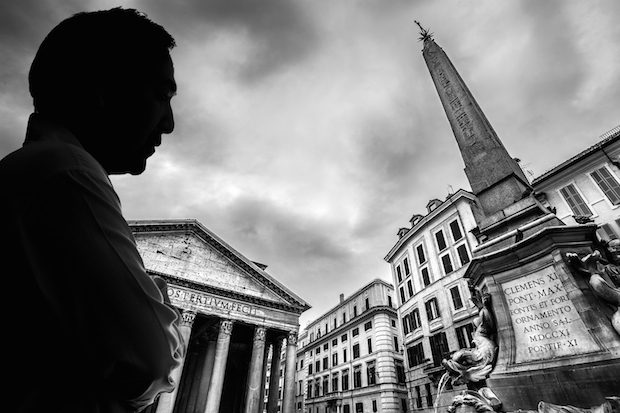Italy’s Philosopher Against Modernity

Few of us have time to read serious books these days. Fewer still have the patience—or the discipline—to engage in the kind of rigorous philosophical analysis needed to understand the roots of the modern crisis. Rare indeed is the individual who can penetrate into deeper truths and reveal the underlying assumptions and conceptual distortions that obscure our view of social and political reality. The Italian philosopher Augusto Del Noce (1910-89) was just such an individual.
Considered one of the most important political thinkers of postwar Italy, his works have escaped the attention of most non-Italian-speaking scholars. But in The Crisis of Modernity, Carlo Lancellotti, a mathematics professor at City University of New York, has carefully selected and translated 12 essays and lectures by Del Noce. For those interested in rigorous conservative critiques of modernity, this collection offers something exotic and new.
Lancellotti says he struggled to select examples of Del Noce’s thought that would give English-speaking audiences a sufficiently representative sampling of the “Delnocian” oeuvre while also maintaining some semblance of a theme. In the end, Lancellotti organized the selections into three thematic sections: modernity, revolution, and secularization (Part One); the emergence of the “technocratic society” (Part Two); and the predicament of the West today (Part Three).
Also included is an appendix comprised of a 1984 interview with Del Noce conducted by 30 Giorni magazine and two additional pieces that did not quite fit into the three main themes of the book. The overall effect is dizzying, with diverse intellectual currents, competing ideological trends, and different political movements meticulously examined by the late Italian thinker.
Born in Pistoia, in the region of Tuscany, into an aristocratic family and raised in the city of Turin, Del Noce was from his earliest years a brilliant student. Although two thinkers dominated the 1920s intellectual milieu in which he grew up—the idealist philosopher Benedetto Croce and the so-called “philosopher of fascism,” Giovanni Gentile—Del Noce charted his own course.
As a private student at the Sorbonne he became acquainted with French scholars such as Étienne Gilson, Jacques Maritain, Jean Laporte, and Henri Gouhier. As Lancellotti explains in his excellent introduction, “For Del Noce, Maritain was, more than anything else, an example of a philosopher fully engaged with history who had developed a deep and original non-reactionary interpretation of the trajectory of the modern world in the light of the classical and Christian tradition.”
Profoundly influenced by Maritain and Gilson, Del Noce adhered to a traditional Catholic perspective, even when he became involved with Italy’s largely left-wing anti-fascist movement. “Almost all my anti-Fascist university classmates … shared [a] liberal-socialist orientation,” he notes in the 1984 interview in the appendix. But Del Noce forged his own approach to contemporary problems. 
Despite constant philosophical research, for most his life Del Noce was first and foremost an educator. He taught at a high school, worked at various think tanks, and eventually made his way through the “byzantine mechanism” of Italy’s university system. He landed a permanent academic post at the University of Trieste teaching the history of modern philosophy. Years later he transferred to the prestigious University of Rome “La Sapienza,” where he taught political philosophy and the history of political ideas. He would spend the rest of his life there—with the exception of serving in the Italian senate, as a member of the Christian Democratic Party, for one term during the 1980s.
A natural teacher, he attracted many students. He became a mentor and a friend to future eminences like historian Roberto de Mattei, president of the conservative Lepanto Foundation and editor of Radici Cristiane, and philosopher-turned-politician Rocco Buttiglione. Both served as his assistants. In 1991 Buttiglione published a biography in Italian about Del Noce, admitting in the beginning that “It is difficult to write a book about a master and friend with whom one has shared an intellectual friendship for more than twenty years.” Nearly a quarter-century later, Buttiglione still says, “To be with him was to take part in an unending learning process that coincided with life itself.”
Del Noce’s dedication to constant learning not only made him an ideal teacher, it also makes him one of the most fascinating—if challenging—thinkers to read. He worked across disciplines—philosophy, history, sociology, religion—and read various languages. Buttiglione tells me that Del Noce “was a man of enormous erudition and he sometimes presupposes in his reader a level of knowledge—especially of the history of philosophy—that goes far beyond that of an ordinary scholar.”
Del Noce can quickly take the reader from Machiavelli, Kant, and Kierkegaard to Hobbes, Hegel, and Heidegger and then to Maistre, Maurras, and Péguy. Along the way, he might refer to Marsilius of Padua, Johan Huizinga, Thomas Muenzer, Karl Löwith, and Manuel García Pelayo. It’s daunting, to be sure. “Nevertheless,” Buttiglione assures me, “the reading is worth the while if you want to understand the world we live in.”
Lancellotti has helpfully provided extensive and detailed explanatory notes. But even in the original Italian, Del Noce expects a lot from the reader, expressing complex ideas in a highly compressed style. As Lancellotti explains, part of this is due to Del Noce’s lifelong determination to “reconstruct intellectual genealogies” by systematically exposing the “deep metaphysical premises of social and political movements.”
In his youth, Del Noce began with a systematic study of Marx. Lancellotti tells us that this marked a turning point in his thinking as he realized that “all of Marx’s thought is a consistent development of the radical metaphysical principle that freedom requires self-creation, and thus the rejection of all possible forms of dependence, especially dependence on God.” In Marxism, Del Noce saw that atheism was “not the conclusion but rather the precondition of the whole system.” And it laid the groundwork for the permissive, secularized, and technocratic society of today.
Del Noce’s other early scholarship focused on the roots of fascist thought and its relationship to other ideologies. He methodically revealed the revolutionary spirit behind fascism and described its relationship to violence. Fascism, he argued, really grows out of communist ideology, and is one of several stages in the long process of Western secularization.
This—combined with the permissiveness, eroticism, and what Del Noce calls the “libertine philosophy” of the sexual revolution—has brought the West to ruin. “The question of eroticism is first of all metaphysical,” he argues. And it arises in the context of a de-sacralized West, “which today has manifested itself as never before.”
Tracing the origins of eroticism, Del Noce says the ideas of sexual freedom had already been fully formulated between 1920 and 1930, beginning with the anti-rationalist Surrealist writers and then further developed by Wilhelm Reich (1897-1957). Reich died in an American prison, “almost completely forgotten,” Del Noce notes, “after having been condemned by the still moral United States.” But the “various beat and hippie movements then rediscovered him.”
Del Noce thus sees the countercultural revolution of the 1960s as the apotheosis of various long-dormant revolutionary strains. He elaborates: “The French ‘May Revolution’ was marked precisely by the hybridization of Marxian themes with Freudian themes and themes inspired by de Sade.” But he also faults the global entertainment industry and the arts, as well as the media and other powerful elites, for having participated in an aggressive “campaign of de-Christianization through eroticism.”
For the revolution against the transcendent to triumph, explains Lancellotti, “every meta-empirical order of truth” had to be abolished. Recreational sex replaced the truth of conjugal love. And the ideas of procreative sex and indissoluble monogamous marriage were destroyed since they presupposed, Del Noce says, “the idea of an objective order of unchangeable and permanent truths.”
Del Noce was clearly a highly astute observer of societal trends. But as Lancellotti points out, he also sought to understand “philosophical history”—which he insisted had to be understood given how profoundly affected the West had been by the philosophies of earlier centuries. Atheism, empiricism, historicism, materialism, rationalism, scientism, etc. had all led to the “elimination of the supernatural” and a “rejection of meta-historical truths.”
At the same time, Del Noce was a staunch critic of the modern West’s affluence, commercialism, and opulence. The loss of belief in the transcendent, he said, had produced a rootless society in which there was nothing to support beliefs in anything other than science and technology, entertainment and the erotic. And behind everything, as Del Noce demonstrated, is nihilism—and the rejection of the Incarnation itself. Thus, the crisis of modernity is really a crisis of spirituality.
Del Noce applied this understanding to his analysis of political phenomena like fascism and communism and to more recent trends like consumerism and commercialism. He provides the “conceptual tools to see the world you live in [from] a completely different perspective,” Buttiglione tells me. “The only kindred spirit I can think of in recent American culture is Russell Kirk.” There can be no more powerful exhortation to read Kirk’s works today than to have Buttiglione compare him to his mentor.
But thanks to Lancellotti, we can also now read Del Noce. It’s true that at times the translation seems a bit awkward. It’s difficult to say how much is due to the difficulty of the original text or to an overly literal approach to translation. It’s almost as if the English rendition deliberately preserved the same elliptical sentence construction and parenthetical expressions that appear in the original Italian. Still, we must be grateful.
This book is not for dilettantes or neophytes. But for those who are sufficiently motivated and whose interest is piqued by questions about the nature of modernity, it may be quite rewarding. Del Noce’s thinking is so advanced and his analysis so sophisticated that it will be years until he is properly appreciated by scholars.
In his biography of Del Noce, Buttiglione writes that “the thought of Del Noce is a common patrimony of Italian culture.” I would suggest a slight revision to this statement: with the material that Carlo Lancellotti has made available to the English-speaking world, Del Noce is now—finally—part of the common patrimony of the West.
Alvino-Mario Fantini is the editor in chief of The European Conservative.